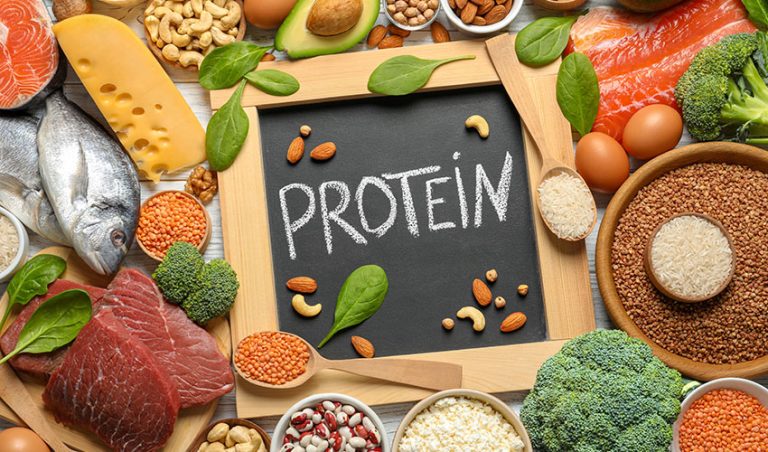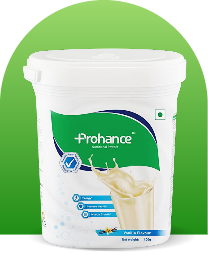
Are you wondering about your protein requirements per day? The facts may surprise you.
The hype around protein consumption is unreal these days. Everyone on social media is raving about how little protein you are consuming and fussing over which is the best protein powder in the market for supplementation. Amongst all this ruckus, it is natural to wonder about daily protein requirements for yourself and whether you are taking enough protein or not.
Don’t give in to the fear mongering and start consuming heaps of protein powder; understand your daily protein needs and create a balanced meal plan rich with nutrients. This article aims to help you understand the role of protein in your diet and how much protein is needed per day.
One of the three essential macronutrients, proteins are considered the primary building blocks of the body. Protein is required by the human body in relatively large quantities to function at optimum levels as it is used to make muscles, organs, skin, tendons, enzymes, hormones, and neurotransmitters, among other essential things.
Proteins consist of amino acids; some of these amino acids are produced by your body, but you need to obtain other essential amino acids through your diet. Different food items have different types of amino acids; many lean meats and several dairy products contain all essential amino acids, but a plant-based diet doesn’t have several food items containing all essential amino acids. If you are a vegan or a vegetarian, you don’t need to fret; there are plenty of options for you to get your protein requirement per day. As a vegetarian, it is imperative for you to consume a variety of protein-rich foods to get all the essential amino acids. If you don’t wish to go the extra mile, you can consider supplementing your diet with protein powders to get your required daily protein intake.
According to the Food Safety and Standards Authority of India (FSSAI), here are the protein intake guidelines for Indians:
Group | Protein |
Adult males | 1 g/kg of body weight |
Adult females | 1 g/kg of body weight |
Pregnant females | 1.4 g/kg of body weight |
Lactating females | 1.2 g -1.4 g/kg of body weight |
Children aged 1 to 9 years | 1.1 g – 1.3 g/kg of body weight |
Children aged 10-12 years | 1.15 g/kg of body weight |
Girls aged 13-15 years | 1.11 g/kg of body weight |
Boys aged 13-15 years | 1.14 g/kg of body weight |
Girls ages 16-17 years | 1 g/kg of body weight |
Boys aged 16-17 years | 1.1 g/kg of body weight |
Various factors influence your daily protein requirements, including physical activity, age, fitness goals, and pre-existing conditions. You can use the values mentioned in the table above for daily protein intake calculation. For example, if a man aged 23 who weighs 58 kg, he requires 58g (58 × 1) of protein. Similarly, a pregnant woman weighing 72 kg requires 101 g (72 × 1.4) of protein.
Try the Nutrition Calculator to get detailed insight on your daily meal
Here is a list of food items that are a rich source of protein:
Food item | Protein (g) (approx) |
Egg (1) | 6 |
Paneer (100 g) | 18-20 |
Milk (250 mL) | 8-10 |
All types of nuts (50 g) | 8-9 |
Cooked chicken (100g) | 22 |
The short answer is no. Consuming a protein-rich diet is beneficial for your health, but an excess of protein in your meals may potentially lead to health issues. Some people may be able to preserve muscle mass and strength by consuming more than necessary amounts of protein; however, increased protein consumption may not necessarily be better for everyone.
Research suggests that adequate protein consumption spaced throughout the day is helpful in enjoying all the goodness of this nutrient. Additionally, if you keep consuming a specific type of protein-rich food, you may not be able to get all the essential amino acids; this is especially true for vegetarians. Thus, it is extremely important that you consume a variety of protein-rich foods to get your daily protein intake recommendations.
Consult Now & get personalized guidance to improve your health and wellbeing
Here are some protein consumption guidelines for you:
Managing your daily consumption of protein needed per day can be difficult, especially with the busy lives people are living today. If you are on the lookout for a ‘quick fix’ that is actually healthy for you, we recommend trying our line of nutritional supplements. Whether you are looking for protein powder for yourself, your child, your loved one with diabetes, or someone recovering from surgery, we have just the right product for you!
Prohance protein powder can help you get the RDA of protein along with other health benefits. For example, Prohance-D, a specially formulated protein powder for diabetics, can provide sustained energy to people with diabetes throughout the day. Additionally, Prohance Junior, kids protein powder is designed to cater to the nutritional needs of a growing child. Find the perfect protein powder for yourself and improve your overall health today!
